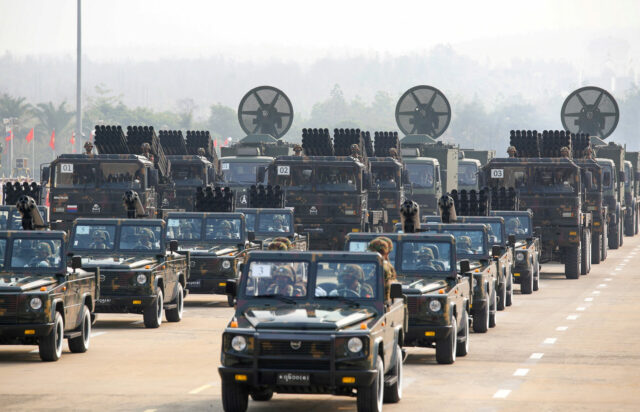Myanmar’s Central Bank has strongly refuted a recent U.N. report claiming the junta maintains access to funds and weapons for its ongoing conflict against anti-coup forces. The bank’s statement, published in a junta newspaper, asserts that financial institutions under its supervision strictly follow prescribed procedures.
U.N. report alleges Myanmar imported weapons despite sanctions
The U.N. report, presented by human rights Special Rapporteur Tom Andrews, alleged that despite international isolation efforts, Myanmar’s junta imported $253 million worth of weapons and related materials. This report implicated international banks, including those from neighbouring Thailand.
However, the Central Bank countered these claims. It emphasised that both local and international banks engaging with Myanmar undergo due diligence for all transactions. They stressed that financial activities are limited to importing essential goods and necessities for civilians, such as medicines, agricultural supplies, and fuel.
This controversy unfolds as Myanmar’s military government faces its most significant challenge since the 2021 coup that overthrew Aung San Suu Kyi’s government. The junta is dealing with multiple conflicts while struggling to stabilise a faltering economy.
Western countries have imposed financial sanctions on Myanmar’s military, banks, and associated businesses. These measures appear to have impacted the junta’s ability to acquire military equipment, although the U.N. report suggests alternative channels may exist.
Report notes shift in Myanmar’s imports
The report also noted a shift in Myanmar’s import patterns. While exports from Singapore plummeted from over $110 million in 2022 to just over $10 million, Thai companies doubled their transfers of weapons and materials to $120 million in 2023.
The Central Bank’s rebuttal highlights the complex nature of Myanmar’s current political and economic landscape. It argues that the U.N. report “severely harms the interests of Myanmar civilians and the relationship between Myanmar and other countries.”
As the situation develops, the conflicting narratives between the U.N. report and Myanmar’s Central Bank underscore the challenges in assessing the impact of international sanctions and the military government’s access to resources. This dispute also raises questions about the effectiveness of global efforts to isolate Myanmar’s junta and the role of regional players in the country’s ongoing crisis.
With inputs from Reuters
Traveller, bibliophile and wordsmith with a yen for international relations. A journalist and budding author of short fiction, life is a daily struggle to uncover the latest breaking story while attempting to be Hemingway in the self-same time. Focussed especially on Europe and West Asia, discussing Brexit, the Iran crisis and all matters related is a passion that endures to this day. Believes firmly that life without the written word is a life best not lived. That’s me, Ashwin Ahmad.





